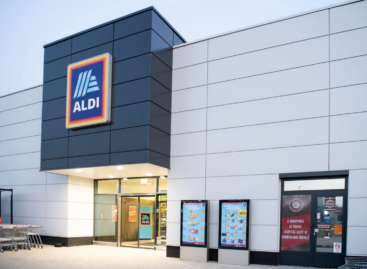ALDI Hungary: The fleet of electric trucks has doubled
ALDI Hungary has taken a significant step in the field of sustainable goods transport: the company announced that it has expanded its fleet with two new electric trucks, thus doubling the number of electric vehicles. As part of the recent expansion, a new tractor unit and a 26-ton truck joined the company’s environmentally friendly vehicle fleet, which will serve the stores of Budapest and Pest counties.

ALDI presented the country’s first electric tractor unit at the end of 2021, and has been continuously developing its electric vehicle fleet ever since. The decision on the latest expansion was preceded by thorough measurements and analyses, during which the company collected data on the performance of electric vehicles by covering more than 150,000 kilometers, the company informed Pénzcentrum.
The measurements clearly showed that electric trucks are not only environmentally friendly, but also more economical than traditional diesel-powered vehicles. During practical tests, during a delivery on a spring day, the diesel truck consumed 28.89 liters of diesel over 117 kilometers, while the electric version used only 183 kWh of electrical energy, which significantly reduces emissions.
The goal of the ALDI company is to further increase the number of its electric vehicles in the near future, thereby reducing its ecological footprint and promoting sustainable corporate operations. The deployment of electric vehicles not only reduces the environmental impact, but also reduces the company’s operating costs in the long term, since electric engines are cheaper to maintain and contain fewer moving parts than diesel engines.
ALDI’s other plans include gradually increasing the range and performance of electric vehicles and expanding the electric charging infrastructure to make logistics processes even more efficient and environmentally friendly. ALDI Hungary is committed to taking a leading role in the application of green technologies in the retail sector.
Related news
The popular downtown ALDI store is reopening
🎧 Hallgasd a cikket: Lejátszás Szünet Folytatás Leállítás Nyelv: Auto…
Read more >Permanently cheaper Hungarian pork: fifth price reduction at ALDI this year
🎧 Hallgasd a cikket: Lejátszás Szünet Folytatás Leállítás Nyelv: Auto…
Read more >Related news
The Store of the Future opens again at the SIRHA Budapest exhibition! (Part 3)
🎧 Hallgasd a cikket: Lejátszás Szünet Folytatás Leállítás Nyelv: Auto…
Read more >New country director at the helm of JYSK Hungary
🎧 Hallgasd a cikket: Lejátszás Szünet Folytatás Leállítás Nyelv: Auto…
Read more >









